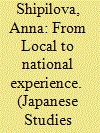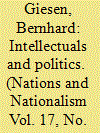| Srl | Item |
| 1 |
ID:
133472


|
|
|
|
|
| Publication |
2014.
|
| Summary/Abstract |
Within Japan, the atomic bombing of Hiroshima is understood as a national experience that sets the country apart from nations that have been spared such devastation. A special phrase the Japanese use to describe their country is yuitsu hibaku kokka, 'the only country that has experienced atomic bombing'. This phrase has become a powerful cliché for depicting Japan to a national and international audience. Even though Hiroshima was the experience of a comparatively small group before it spread to a larger collectivity, its transformation into a collective experience is regarded as a natural outcome, explained by the devastating nature of the event. This perspective, however, does not fully explain why people who have different war experiences unconditionally accept as their own experiences ones which they have not personally suffered. This article aims to clarify the process by which the Hiroshima experience was nationalised, and the period of its nationalisation. It also examines whether this transformation means that Hiroshima has become a 'trauma for everybody'. This is achieved through the application of Jeffrey C. Alexander's work on the transformation of Holocaust memories into a collective trauma.
|
|
|
|
|
|
|
|
|
|
|
|
|
|
|
|
| 2 |
ID:
118919


|
|
|
|
|
| Publication |
2013.
|
| Summary/Abstract |
This paper adds to a relatively new line of research investigating inadvertent transformations of urban colonial space generated by collective trauma. To the now classic iterative, and racial dynamics of Neild's 'accommodation' in the development of Madras,1 and of Yeoh's 'contesting' of the built environment in Singapore2-specifically in the tugging and pulling between local and colonial influences within the spatial discourse of colonial port cities-needs to be added that of single or multiple-event collective trauma. Such trauma, perceived as brought upon by unexpected external causes, might consolidate, perhaps accelerate, or even sever a previous sequence of spatial negotiation, particularly if that sequence was politically vulnerable or immature. The paper is a focused account of such an occurrence: the small-scale yet intensely traumatic events of Hong Kong Island while still in its colonial infancy in 1843, the year of the 'Hongkong Fever'. It argues that a new conception of malaria-considered then a miasma-now linked both to location and construction, led to the first reactive, yet decisive, reconfiguring of a previously improvised urban colonization process, consequently salvaging Hong Kong's position within a wider imperial context
|
|
|
|
|
|
|
|
|
|
|
|
|
|
|
|
| 3 |
ID:
104108


|
|
|
|
|
| Publication |
2011.
|
| Summary/Abstract |
By imagining their audiences, intellectuals invented and constructed the collective identities of nations and transnational communities like Europe or humankind. Four ideal types of intellectuals are outlined by describing them in their relation to politics: the intellectual as cosmopolitan ascetic; the intellectual as enlightened legislator; the intellectual as revolutionary; and the intellectual as the voice of a traumatic memory. These ideal types change over time in response to their focus of attention and their mode of communication. Because of changes in their media (from handwritten to printed books) and changes in their written language (from Latin to French and Italian, and further to vernacular languages), intellectuals were able to change views on past, present and future times. Today, they are involved in (civic) resistance but rarely in politics per se. By renewing the tension of the sacred and profane - the so-called axial-age revolution - contemporary intellectuals in Eastern Europe are decoupled from direct political power.
|
|
|
|
|
|
|
|
|
|
|
|
|
|
|
|